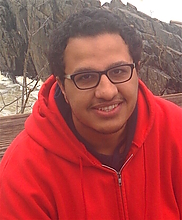 A doctoral student in the Computational Linguistics and Information Processing (CLIP) Laboratory has won a coveted IBM Ph.D. Fellowship that will help support his research in natural language understanding.
A doctoral student in the Computational Linguistics and Information Processing (CLIP) Laboratory has won a coveted IBM Ph.D. Fellowship that will help support his research in natural language understanding.
Ahmed Elgohary, a third-year doctoral student in computer science, was one of 50 students worldwide to receive the IBM Ph.D. Fellowship, which offers a stipend, education allowance and mentoring from a senior IBM researcher. The program is designed to provide strong support for doctoral students that have an interest in solving problems important to IBM and that are fundamental to innovation.
Elgohary’s research involves natural language inference, an important task in natural language processing. By using computational linguistic methods such as informal reasoning, lexical semantic knowledge, and variability of linguistic expression, researchers seek to determine whether a natural language hypothesis can justifiably be inferred from a natural language premise.
"I am grateful for the IBM support, as it gives me the flexibility to explore different research problems," says Elgohary. "Also, I have an IBM mentor now who I can discuss my research with on regular basis. That will further help me make sure that my research is aligned with addressing the important and challenging problems in industry.”
He has already worked with IBM, having done a three-month internship in 2015 with the company's machine-learning systems group. That collaboration resulted in Elgohary writing a paper with the IBM researchers that examined compressed linear algebra for large-scale machine learning.
At Maryland, Elgohary has worked closely in the CLIP lab with Marine Carpuat, an assistant professor of computer science, Doug Oard, a professor of information studies, and Philip Resnik, a professor of linguistics. Carpuat, Oard and Resnik all have appointments in the University of Maryland Institute for Advanced Computer Studies (UMIACS).
“The IBM Graduate Fellowship is a well-deserved recognition of Ahmed's track record and his strong future potential," says Resnik, who currently co-advises Elgohary with Oard. "Ahmed's cutting-edge work—at the intersection of machine learning and computational semantics—is a great example of the CLIP Lab's multidisciplinary approach.”
Elgohary says he finds the multidisciplinary environment of the CLIP lab beneficial to his work.
"This is something that is very special here, the open discussion and collaboration, particularly as it involves linguists, computer scientists and others," he says.